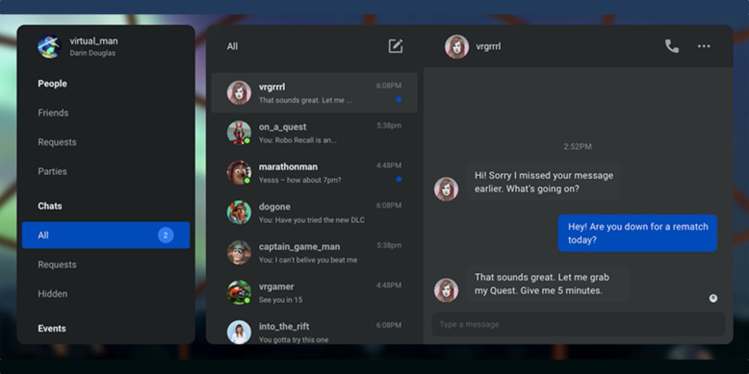Ever since Facebook acquired Oculus, users expected that the social media giant would begin to integrate its services more deeply and conspicuously into the virtual reality platform. That’s happening today, Oculus says in a blog post, as Facebook-powered social features and identity verification are arriving across the Oculus platform — changes that will require use of a Facebook account, assuming users want to take advantage of them.
The social features were teased at Oculus Connect 6, but now specifically include the following options:
- Chats and messaging with friends while wearing an Oculus headset
- Automatic joining of friends at their current locations within multi-user apps and multi-player games, as well as sharing of links to your current locations
- Events and Parties for multi-person gatherings, and
- Photo, video, and livestream sharing from Oculus headsets to Facebook Groups
Additionally, Facebook is disclosing that if you log into your Facebook account from the Oculus platform, data from your VR experience will be used for advertising. While this isn’t hugely surprising given that much of Facebook’s revenue comes from ads, some users had hoped that paying hundreds of dollars for Oculus hardware would keep their usage data private — or at least separate from the Facebook mothership.
There will be options to keep Oculus and Facebook friends lists separate, but there’s also an option to import contacts if you like. Additionally, the company suggests that it is not using on-device data, such as imagery of what’s in a user’s home as spotted by room-mapping cameras, for advertising purposes.
If a user chooses not to log in with Facebook, the company says it won’t share VR data to allow third parties to target ads based on Oculus platform usage. Additionally, its privacy policy has been updated to clarify its sharing practices. But given the company’s history of data sharing with questionable entities, its supposed limitations and reassurances may not be comforting.
Facebook plans to roll out Horizon, a broad social and entertainment experience with hooks for both Oculus and Facebook users, in the coming year. The company has suggested that using Facebook identities, which are supposed to be backed by users’ real-world personal details, will enable more meaningful blocking and reporting of bad actors on the service. Users will continue, for now, to have independent Oculus accounts for their Horizon identities, but only time and user feedback will determine how long the dual-account system is maintained.

